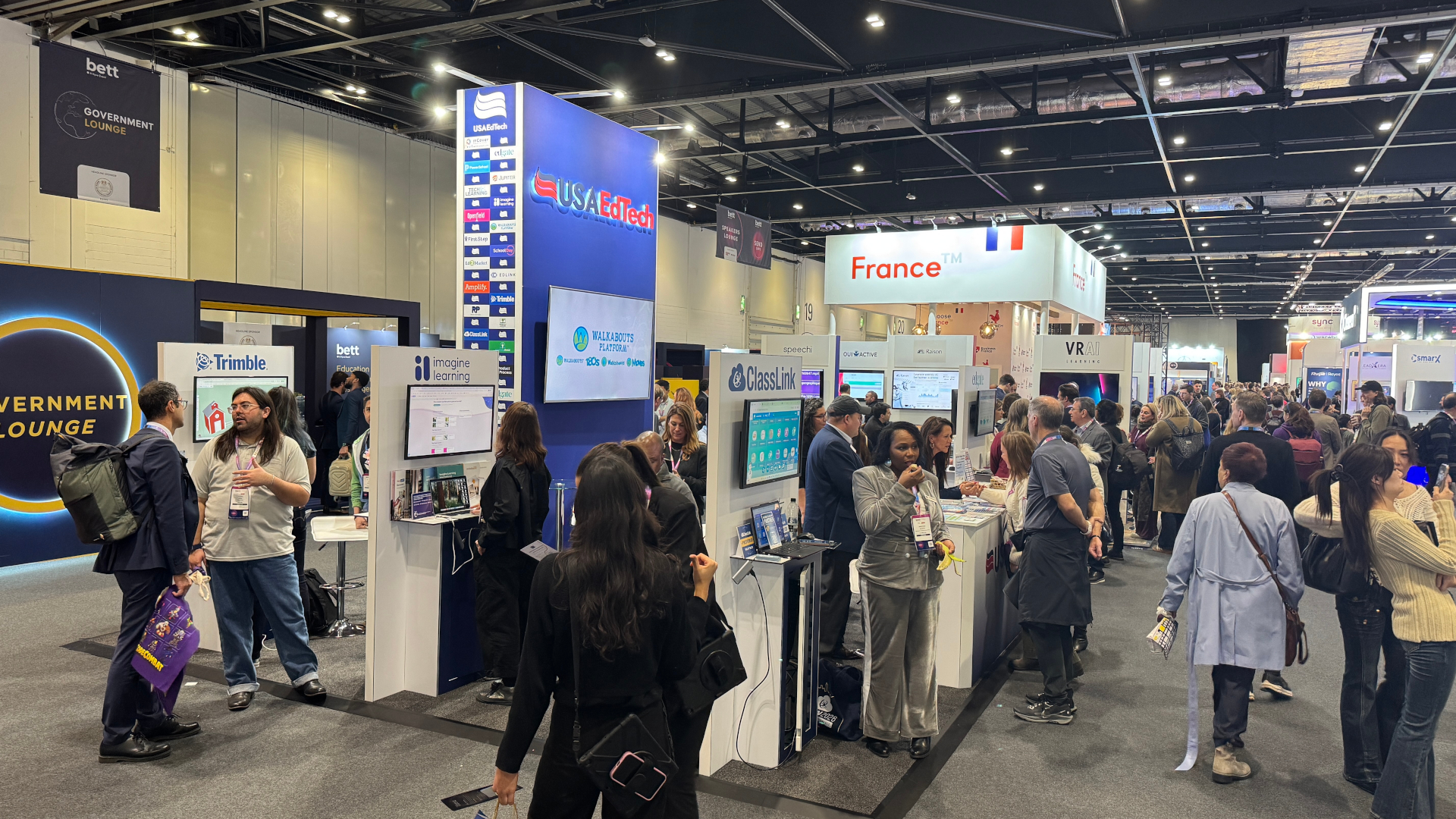The Tech&Learning 100@30: Present

By Matt Bolch; illustrations by Jay Bevenour
AS PART OF OUR 30TH-ANNIVERSARY CELEBRATION, Tech & Learning continues to compile a compendium of the most influential people affecting the advancement of technology in education. Our second group of honorees is plucked from the present: today’s leaders who are changing the landscape of edtech through innovation and vision.
LOOKING FOR LINDA? Linda Roberts was honored in our March Issue along with 29 of her colleagues. Read it online here: www.techlearning.com/30thanniversary
Arne Duncan
Arne Duncan, U.S. Secretary of Education, spent more than seven years as CEO of Chicago Public Schools and as such is the longest-serving big-city superintendent in the country. During his confirmation hearings, he called education “the civil rights issue of our generation.” His father was a professor at the University of Chicago, and his mother runs an independent early-learning center on Chicago’s South Side. Under Duncan’s leadership, the city district had record gains in elementary reading and math standards. Gains in ACT scores among high schoolers were triple those achieved nationally.
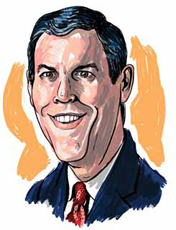
Nancy Knowlton
Nancy Knowlton is president, co–chief executive officer, and cofounder of SMART, which introduced its interactive whiteboard in 1991. Since then, the Canadian company has sold more than 1.5 million whiteboards in the education, business, and government sectors and has a nearly 48 percent share worldwide. Knowlton, who is responsible for the company’s day-to-day direction, has spoken widely on 21st-century education. In 2002, she was on an independent commission that reviewed the province of Alberta’s system of basic education. She and cofounder David Martin won the 1999 Prairies Region Technology Entrepreneur of the Year award and a Manning Innovation award in 2002.
Tools and ideas to transform education. Sign up below.
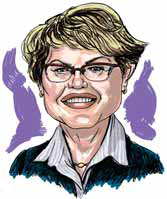
Karen Cator
Karen Cator, director of the Office of Educational Technology at the U.S. Department of Education, has long advocated for students. She previously directed leadership and advocacy efforts in education at Apple, where she focused on the intersection of education policy and research, emerging technologies, and the real conditions faced by teachers, students, and administrators. Prior to joining Apple in 1997, Cator served in the public-education sector, leading the planning and implementing of technology in Alaska. She was also special assistant for telecommunications for that state’s lieutenant governor. She is a past chair of the Partnership for 21st Century Skills and has served on the board of the Software & Information Industry Association’s education division.
Mitchel Resnick
Anybody who likes building robots with a LEGO MindStorms kit can thank Mitchel Resnick. The LEGO Papert Professor of Learning Research and head of the Lifelong Kindergarten group at the MIT Media Laboratory investigates how new technologies can help people create. One offshoot of that research has been the development of a “programmable brick” that formed the basis of the LEGO MindStorms robotics kit. Another is Scratch, an online community where children can program and share interactive stories, games, and animations. He cofounded the Computer Clubhouse, a global network of after-school centers where disadvantaged youth use new technologies to express themselves creatively.
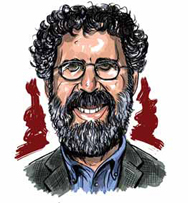
Dean Kamen
Dean Kamen founded FIRST (For Inspiration and Recognition of Science and Technology), an international robotics competition that attracted more than 137,000 children from 42 countries as contestants in 2009. The purpose of FIRST is to inspire children, especially girls and minorities, to pursue careers in science and mathematics. Kamen, a prolific inventor (more than 440 patents) and a member of the National Inventor Hall of Fame, is best known for his invention of the Segway Human Transporter. The president of DEKA Research & Development Corp., he is working on a water-purification system to solve the world shortage of drinkable water.
Douglas E. Van Houweling
Douglas E. Van Houweling led a statewide computing network in Michigan in 1987 that was tasked with helping run the National Science Foundation Network, a backbone of the early Internet. Van Houweling is a professor in the School of Information at the University of Michigan and founding president and CEO of Internet2, an advanced networking consortium led by the research and education community. He was a member of the National Academies Panel on the Impact of IT on the Future of the Research University. Van Houweling received the EDUCAUSE 2002 Excellence in Leadership Award.

Michael Milken
Every teacher should know who Michael Milken is. The financier and philanthropist has supported educators since 1985 through the Milken Educator award, the largest teacher-recognition program in the United States. The organization has awarded $60 million to more than 2,400 K–12 teachers and principals, each of whom received $25,000 and an opportunity to participate in an annual professional-development conference. Mike and Lowell Milken co-founded the Milken Family Foundation in 1982 (Lowell Milken created the Milken Educator Awards and chairs the foundation), but Michael has been generous since at least 1972, when his mother-in-law was diagnosed with breast cancer. In addition to medical research and education, the foundation addresses inner-city problems and seeks to aid families of children with cancer and youth programs.
Chris Dede
Chris Dede, Timothy E. Wirth Professor in Learning Technologies at the Harvard Graduate School of Education, researches how people learn in the wake of emerging technologies. His teaching models the use of information technology to distribute and orchestrate learning across space, time, and many interactive media. His research spans emerging technologies for learning, infusing technology into large-scale educational-improvement initiatives, policy formulation and analysis, and leadership in educational innovation. He currently conducts funded studies in developing and assessing learning environments based on modeling and visualization, online teacher professional development, wireless mobile devices for ubiquitous computing, and multiuser virtual environments.
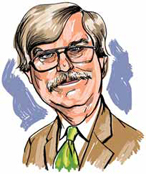
Roberto J. Rodriguez
Roberto J. Rodríguez has worked closely on education issues for most of his political career. He currently serves on the White House Domestic Policy Council as special assistant to President Obama for education. Previously, Rodríguez was chief education counsel to the late Senator Edward M. Kennedy, chairman of the Health, Education, Labor and Pensions (HELP) Committee. He led policy development and strategy for legislation that addressed early-childhood education, elementary and secondary education, higher education, and adult education. Earlier he had worked with the HELP Committee on the No Child Left Behind Act.
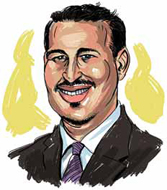
Chris Lehmann
Chris Lehmann is founding principal of the Science Leadership Academy, a progressive science and technology high school in Philadelphia. Lehmann returned to his native city after nine years as an English teacher and technology coordinator at New York’s Beacon School, known for its integration of technology. While there, he was honored by the youth-development organization MOUSE as a Champion of Technology and by the National School Board Association in 2006 as one of “20 to Watch” among American educators. He is the author of the education blog Practical Theory (www.practicaltheory.org).

Jaime Carbonell
Jaime Carbonell’s research areas include artificial intelligence and language technologies, such as machine translation, machine learning, and computational biology, and usually combine theory, experimentation, and system building. He directs the Language Technologies Institute and is the Allen Newell Professor of Computer Science at Carnegie Mellon University. Active learning, another of Carbonell’s research areas, seeks to identify the fewest possible labeled training instances necessary to grasp a concept. According to his Web site, he is particularly interested in ensemble-based active learning, in active learning for highly skewed class distributions, and in differential labeling cost models.
Joyce Valenza
Joyce Valenza, teacher-librarian at Springfield Township High School, Erdenheim, Pennsylvania, has been modeling evolving tech-integrated practice for more than 30 years. Valenza created her first virtual library in 1996. A mentor and leader in edtech and information fluency, she has taught at the graduate level and publishes books and videos about information skills. She writes the NeverEndingSearch blog for School Library Journal as well as regular features for edtech and library journals. Valenza is an American Memory Fellow and a Milken Educator. She has won awards for her library program, Web sites, videos, and blogs. She recently founded the TL Virtual Café, TeacherLibrarianNing, and the AASL Geek Squad.
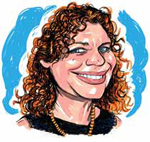
Mark Bauerlein
Emory University professor Mark Bauerlein turned heads with his 2008 book The Dumbest Generation: How the Digital Age Stupefies Young Americans and Jeopardizes Our Future; Or, Don’t Trust Anyone Under 30. In it he posits that the proliferation of technology causes precipitous drops in general knowledge and reading in general. As he told an interviewer for The Hub, Emory’s quarterly magazine, “You can quote me on this: You guys don’t know anything.” Bauerlein has taught at Emory since 1989 except for a break between 2003 and 2005, when he directed the office of research and analysis at the National Endowment for the Arts.
James Paul Gee
After pioneering new literacy studies with his 1990 book Sociolinguistics and Literacies, in his more recent works professor James Paul Gee draws correlations between video games, language, and learning. What Video Games Have to Teach Us About Learning and Literacy, published in 2003, promotes the effective- learning principles that a good video game can impart. His 2004 follow- up, Situated Language and Learning, describes video games in terms of overall learning and literacy, explaining how they can aid in school reform. Gee is the Mary Lou Fulton Presidential Professor of Literacy Studies at the Mary Lou Fulton College of Education at Arizona State University.
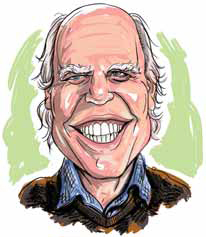
Gary Stager
Gary Stager believes in the power of the computer for learning and selfexpression. For nearly 30 years, he has educated and spoken about education. Professional development in the world’s first laptop schools and designing online graduate school programs are among his accomplishments. Stager is a collaborator in the MIT Media Lab’s Future of Learning Group and a member of the One Laptop Per Child Foundation’s Learning Team. He is a visiting professor at Pepperdine University, an associate of the Thornburg Center for Professional Development, and executive director of the Constructivist Consortium.
David Warlick
David Warlick operates Landmarks for Schools, a Web site dedicated to helping teachers and students “find information and tools designed to help us redefine literacy for the 21st century.” It is the most visible method of outreach of the Landmark Project, the consulting and innovations company Warlick founded. His attribution tool, Citation Machine, has 500,000 hits a day, and his classroom blogging service has more than 200,000 users. Previously, Warlick was a classroom teacher, district administrator, and staff consultant with the North Carolina State Department of Public Instruction. He has written three books on instructional technology and 21st-century literacy and has spoken widely on education.
Andrea diSessa
Andrea diSessa is director of the Boxer Computer Environment Project at the University of California, Berkeley, where he is the Corey Professor of Education in the Graduate School of Education. As the project’s Web site explains, “Boxer is the first example of a ‘computational medium’ for real people....Boxer is based on a literacy model. That is, we want computational media to be useful to everyone, as text is, except we want to extend from a static and linear tradition to a new, dynamic and interactive medium.” DiSessa’s current work focuses on students’ ideas about “patterns of behavior and control” and the development of the concept of force.
Gina Bianchini
Until March, Gina Bianchini was CEO of Ning, the social-networking platform she founded with Marc Andreessen. Published reports indicate that Bianchini left after more than five years to pursue other opportunities. Those include being entrepreneur in residence at Andreessen Horowitz, the venture capital firm that Andreessen cofounded. A successful entrepreneur, she previously founded and served as chief marketing officer at Harmonic Communications. She also directed business development and investor relations at CKS Group and was a financial analyst at Goldman Sachs.
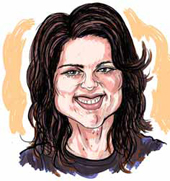
Jomo W. Mutegi
Jomo W. Mutegi is executive director of Sankoré Institute, a nonprofit science and education research organization. Sankoré seeks to develop the intellectual infrastructure in African and African-American communities through its focus on science, technology, engineering, and mathematics. The institute concentrates on research and development, education, and application and policy. Mutegi’s research explores the worldview of students and student-teacher interaction as factors that determine future career choice. He received the Outstanding Junior Scholar award and, in 2003, the United States Early Career Researcher award.
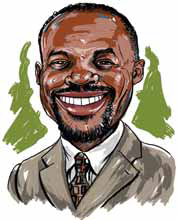
Neeru Khosla
Neeru Khosla wants to reduce the high cost of textbook materials, one of the reasons that in 2006 she cofounded the CK-12 Foundation, where she is executive director. The nonprofit CK-12 focuses on the K–12 market across the world through its open-content Web-based collaborative model, called FlexBook. The aim of FlexBook is to provide good core content and an adaptive environment for learning. Khosla is a founding member of the K–12 Initiative of the D-School (Hasso Plattner Institute of Design) at Stanford University and a member of the committee to expand the program.
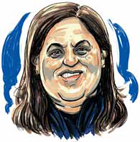
Linda Darling- Hammond
Linda Darling-Hammond launched the Education Leadership Institute and School Design Network at Stanford University, where she is Charles E. Ducommun Professor of Education. She is a former president of the American Educational Research Association and member of the National Academy of Education. Darling-Hammond was executive director of the National Commission on Teaching and America’s Future when it released the landmark 1996 report “What Matters Most: Teaching for America’s Future.” The report brought about changes in the policies affecting teaching and teacher education and was named among the reports that influenced education the most.
Henry Jenkins
Henry Jenkins, Provost’s Professor of Communication, Journalism and Cinematic Arts at the University of Southern California, has recently focused his research on media convergence. Before arriving at USC in the fall of 2009, he spent a decade directing the MIT Comparative Media Studies Program and as the Peter de Florez Professor of Humanities. While at MIT, he was one of the principal investigators for the Education Arcade, a consortium of educators and business leaders who advocated educational uses for computer and video games. His recent research argues that understanding the relationships among media should be based on how individuals interact with and combine them.
G. Wayne Clough
G. Wayne Clough began his tenure as the twelfth secretary of the Smithsonian Institution in 2008 after leading the Georgia Institute of Technology for 14 years. The Georgia Tech alumnus, a civil engineer by training and the first alum to lead the college, oversaw more than $1 billion in new construction during a push to increase the school’s enrollment and prestige. Among Clough’s goals at the Smithsonian are to digitize many of the institution’s 137 million objects and to beef up its K–12 educational programming to link methods of informal education to its formal education system. He was appointed to the National Science Board in 2004.
Clayton M. Christensen
Clayton M. Christensen developed the concept of disruptive innovation, a framework that describes how a product or service develops in a simple form at the bottom of a market and can then displace established competitors as it moves upmarket. His 1997 book The Innovator’s Dilemma explains the concept, which he is now applying to promote solutions in the education and health-care sectors through the Innosight Institute, a nonprofit think tank he cofounded. He is also the Robert and Jane Cizik Professor of Business Administration at Harvard Business School.
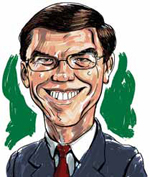
Michael Horn
With Clayton M. Christensen, Michael Horn founded the Innosight Institute, a nonprofit think tank that applies Christensen’s theories of disruptive innovation to social problems such as education and health care. Horn is the organization’s executive director of education and secretary. He wrote Disrupting Class: How Disruptive Innovation Will Change the Way the World Learns with Christensen and Curtis W. Johnson. He worked at America Online during the AOL.com relaunch and was once employed by David Gergen, journalist, attorney, and adviser to four U.S. presidents, as Gergen’s research assistant.
Sir Ken Robinson
Sir Ken Robinson knows about the transformative power of creativity and innovation. Queen Elizabeth II knighted him in 2003 for his contributions as a writer, speaker, and leader in creativity, the arts, and education. He was the lead author of the 1999 report “All Our Futures: Creativity, Culture and Education” (also known as the Robinson Report), which influenced government and corporate attitudes toward creativity. In the late ’80s, Robinson directed the Arts in Schools Project, a UK initiative to improve the teaching of the arts, and chaired the National Advisory Committee on Creative and Cultural Education. He is professor emeritus at Warwick University.
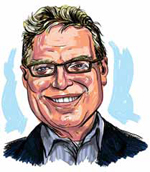
Amy Bruckman
Amy Bruckman studies the “constructionist” philosophy of education as it relates to the design of online communities. According to her Web site, the associate professor at the College of Computing at Georgia Tech believes that the “Internet has a unique potential to make constructionist learning scalable and sustainable in real-world settings, because it makes it easy to provide social support for learning and teaching. In electronic-learning communities, participants can help motivate and support one another’s activities.” Bruckman, a member of the university’s Graphics, Visualization, and Usability Center, currently studies wikis as constructionist- learning environments.
Robert Kozma
Despite having retired from the Center for Technology in Learning, Robert Kozma continues to help link technology with education reform and economic and social development. He is principal consultant at Kozmalone Consulting, which he founded in 2002 after retiring from SRI International’s Center for Technology in Learning, for which he is emeritus director and principal scientist. CTL’s goal is to improve teaching and learning through innovation and inquiry, which include developing and assessing interactive-learning environments. Kozma consults nationally and internationally with government, nongovernment, and commercial clients that have included the agencies the World Bank, UNESCO, and the Ford Foundation.
